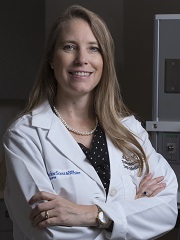BSW Health: ‘Women Leaders in Medicine’ program prevents burnout
- The Women Leaders in Medicine program at Baylor Scott & White Health fights burnout by empowering women to build leadership skills, establish nurturing relationships and recognize their abilities.
- The semiannual meetings, organized by a 10-person committee, feature peer-to-peer support, leadership training and opportunities to interact with senior-level leaders from across the organization.
- In addition to semiannual big-group meetings, the program has spawned book clubs, online connections, mentoring relationships and networking events to support women clinicians in local markets.
In addition to my clinical role — director of gastroenterology for Baylor Scott & White Health’s Central Texas Division — I’ve served in many other leadership roles, including wellness director and president of the Clinical Staff Organization, which represented 1,200 physicians during my term.

In those positions I had organization-wide responsibilities, and I saw two problems that needed to be solved. For one, many of my female peers entering their mid-career years were moving to part-time status or quitting altogether.
I empathized with their reasons: the pressure of being an excellent physician while also keeping the house running, being expected to be fashionable all the time, feeling like we can never be grumpy, and on and on, not to mention the harassment and discrimination that some women experience. But these women had gone to medical school and made the investment in their training, and our patients need them. I wanted to find a way to keep them engaged.
The other problem I saw was that, despite being well-qualified, many women in my generation of physicians did not feel equipped to mentor others or step into leadership roles.
To address those issues, I gathered 10 women physicians from various specialties in 2017 to organize a half-day summit for BSW women clinicians in Central Texas. We were shocked to have 120 women sign up for that first event, with attendees coming from as far as College Station (80 miles away) and Austin (70 miles) at 4 p.m. on a workday.
The success of that first event launched the Women Leaders in Medicine program, the goal of which is to equip our female clinicians with the skills, perspective and support they need to stick with their careers and confidently pursue leadership opportunities. In the two years since, we consistently have received feedback such as: “This is keeping me in practice.” “This gives me hope that I can keep doing this.” “You are inspiring me, and together we can make it through.”
The program in action
We now host twice-yearly summits, scheduled at the end of the workday, that attract more than 300 women clinicians from throughout the health system. Physicians from every specialty, as well as audiologists and psychologists, are represented. Each event is evenly split between peer-to-peer support, leadership training and interaction with senior-level leaders from across the organization.
Many of our participants have carried this work to their local markets, starting book clubs and dinner groups, committing to mentor/mentee relationships and creating online connections to support one another.
In a survey conducted this spring, 85% of attendees said the Women Leaders in Medicine program helps prevent burnout. To me, that’s the Holy Grail.
Getting the program started
Any program of this nature requires contributions from many areas. Our program has an administrator, a physician-leader serving as champion, and a committee — I recommend a group of no more than 10 to 15 women physicians — to develop agendas and organize events. The administrator should produce surveys to be administered before, during and after the event to make sure it is accomplishing its objectives.
Other tips for running this kind of program include:
Count on last-minute cancellations. Many women physicians are juggling family and career responsibilities, and many tend to put others’ needs before their own plans. At least 15% of those who RSVP’d likely will have to cancel on the day of the event. You may want to consider accepting more participants than you can accommodate, knowing that not all will be able to attend.
Prepare for pushback. Some snide comments from male colleagues who hear about your events can be expected; be prepared to model the civility and respect that you expect women physicians to receive. Within your group, strongly protect an environment of safety for women physicians and insist on respect for all colleagues, regardless of gender.
Create opportunities for senior leaders to participate. We typically invite a few male colleagues — regional chief medical officers, directors of large divisions, our CEO — to attend our events so they can understand the issues of concern to women physicians.
When our senior leadership team asked how they could contribute, we suggested they assist in donating and serving food and beverages. The president and other members of the C-suite graciously participated, donning bow ties and doling out food and refreshments.
We also asked the chief of surgery to provide leadership books — “Breaking Through Bias,” “The Coaching Habit,” “Grit” and a few others — for attendees at one of our events. We placed stickers inside the books to acknowledge that he and his department were supporting our group.
The success of our program shows that women physicians are willing and eager to participate in programming that helps them thrive in challenging careers where too often they do not receive the opportunities and support they deserve.





